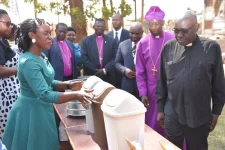Archbishop Stephen Samuel Kaziimba Mugalu made a firm pledge regarding environmental protection at the launch of Environment Focus Month for the Church of Uganda held in Namirembe. The Provincial Assembly approved March for raising awareness about conserving natural resources during their meeting at Uganda Christian University back in August 2024. The Archbishop praised the National Environment Management Authority for efforts to reclaim wetland areas across the country.
He expressed disappointment about fairness issues with evictions. According to the Archbishop, poor citizens were removed from wetlands, yet wealthy individuals and their factories remained untouched in similar areas. He asked authorities to enforce rules equally for everyone and develop clear guidelines about prohibited construction zones with proper public education. The recent disaster at the Kiteezi landfill prompted his call for better waste disposal planning throughout Uganda.
The Archbishop noted the unfortunate loss of life at Kiteezi resulted from inadequate garbage management systems. He pointed out that the lack of comprehensive waste disposal strategies for Kampala and other urban centers leads to roadside dumping that damages national beauty. On behalf of the Church, he committed to using all available platforms for environmental advocacy and promoting renewable energy use in churches, offices, institutions, and homes throughout congregations.
Tree planting became a key focus as the Archbishop urged followers to combat deforestation. He connected current heat conditions directly to excessive timber harvesting and called on bishops nationwide to require every confirmation candidate to plant a tree. His directive extended to clergy members who should ensure new trees mark each child's baptism ceremony. The Archbishop emphasized collaboration with other faith-based and cultural organizations to create positive environmental change.
Parliament's Deputy Speaker Thomas Tayebwa, represented by Ora County MP Lawrence Songa, applauded the Church's environmental commitment. As Chairman of the Parliamentary Forum on Climate Change-Uganda, Songa acknowledged that religious institutions have a unique influence over behavior change. Government officials promised support for Church environmental programs and stressed the importance of partnerships between religious organizations and official agencies to address ecological challenges.
Canon William Ongeng announced the Church's upcoming Strategic Plan will include a specific focus on Environment Conservation and Disaster Risk Reduction from 2026 through 2030. The Church aims to decrease carbon emissions across all operations and help communities build environmental resilience. Ongeng emphasized partnerships remain essential since significant change requires a collaborative effort among organizations sharing urgent concerns for environmental protection.
The Church Director of Household and Community Transformation, Reverend Andrew Agaba, highlighted ongoing conservation work. He mentioned successful tree planting programs and participation in international climate advocacy through Conference of Parties meetings over five consecutive years, including the most recent event in Azerbaijan. National Forestry Authority Executive Director Stuart Maniraguha praised these efforts and described environmental protection as essential for survival rather than merely sustaining livelihoods.
According to Patricia Roy Akullo from the Finance Ministry, Uganda faces significant financial requirements for climate action. The country needs approximately $28.1 billion through 2030, averaging $4.1 billion annually, to meet commitments under the updated Nationally Determined Contributions and Green Growth Development Strategy. Uganda currently accesses funds through mechanisms like the Green Climate Fund, Adaptation Fund, and Global Environment Facility alongside technical assistance programs targeting agriculture, water, transport, and energy sectors.
He expressed disappointment about fairness issues with evictions. According to the Archbishop, poor citizens were removed from wetlands, yet wealthy individuals and their factories remained untouched in similar areas. He asked authorities to enforce rules equally for everyone and develop clear guidelines about prohibited construction zones with proper public education. The recent disaster at the Kiteezi landfill prompted his call for better waste disposal planning throughout Uganda.
The Archbishop noted the unfortunate loss of life at Kiteezi resulted from inadequate garbage management systems. He pointed out that the lack of comprehensive waste disposal strategies for Kampala and other urban centers leads to roadside dumping that damages national beauty. On behalf of the Church, he committed to using all available platforms for environmental advocacy and promoting renewable energy use in churches, offices, institutions, and homes throughout congregations.
Tree planting became a key focus as the Archbishop urged followers to combat deforestation. He connected current heat conditions directly to excessive timber harvesting and called on bishops nationwide to require every confirmation candidate to plant a tree. His directive extended to clergy members who should ensure new trees mark each child's baptism ceremony. The Archbishop emphasized collaboration with other faith-based and cultural organizations to create positive environmental change.
Parliament's Deputy Speaker Thomas Tayebwa, represented by Ora County MP Lawrence Songa, applauded the Church's environmental commitment. As Chairman of the Parliamentary Forum on Climate Change-Uganda, Songa acknowledged that religious institutions have a unique influence over behavior change. Government officials promised support for Church environmental programs and stressed the importance of partnerships between religious organizations and official agencies to address ecological challenges.
Canon William Ongeng announced the Church's upcoming Strategic Plan will include a specific focus on Environment Conservation and Disaster Risk Reduction from 2026 through 2030. The Church aims to decrease carbon emissions across all operations and help communities build environmental resilience. Ongeng emphasized partnerships remain essential since significant change requires a collaborative effort among organizations sharing urgent concerns for environmental protection.
The Church Director of Household and Community Transformation, Reverend Andrew Agaba, highlighted ongoing conservation work. He mentioned successful tree planting programs and participation in international climate advocacy through Conference of Parties meetings over five consecutive years, including the most recent event in Azerbaijan. National Forestry Authority Executive Director Stuart Maniraguha praised these efforts and described environmental protection as essential for survival rather than merely sustaining livelihoods.
According to Patricia Roy Akullo from the Finance Ministry, Uganda faces significant financial requirements for climate action. The country needs approximately $28.1 billion through 2030, averaging $4.1 billion annually, to meet commitments under the updated Nationally Determined Contributions and Green Growth Development Strategy. Uganda currently accesses funds through mechanisms like the Green Climate Fund, Adaptation Fund, and Global Environment Facility alongside technical assistance programs targeting agriculture, water, transport, and energy sectors.












